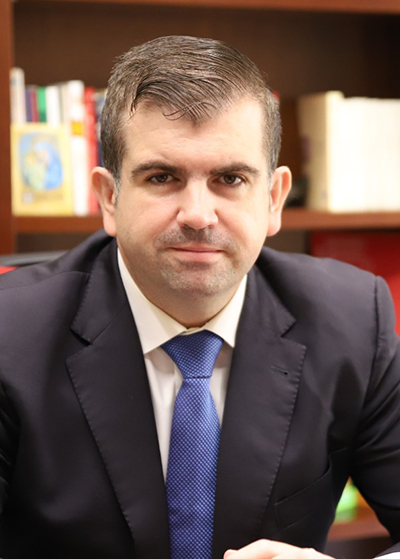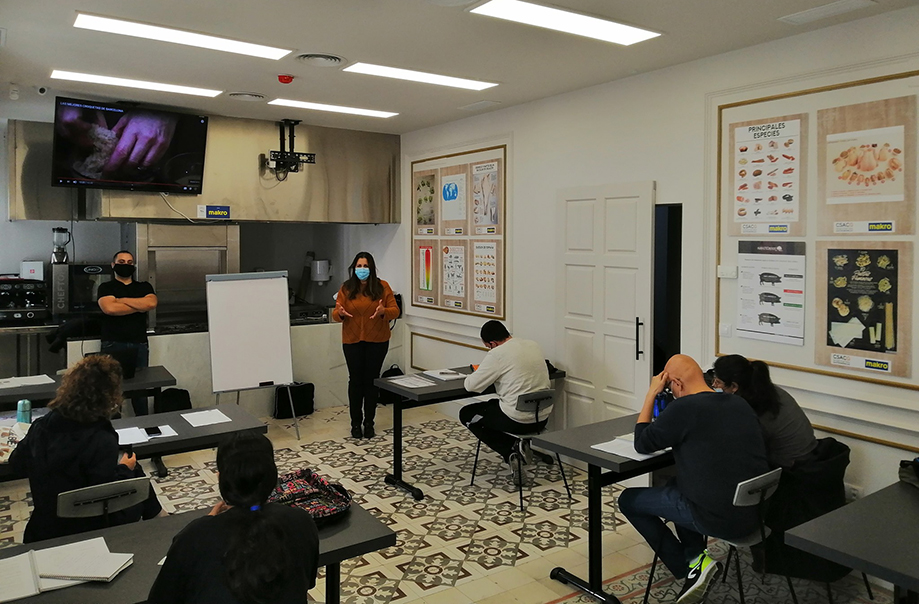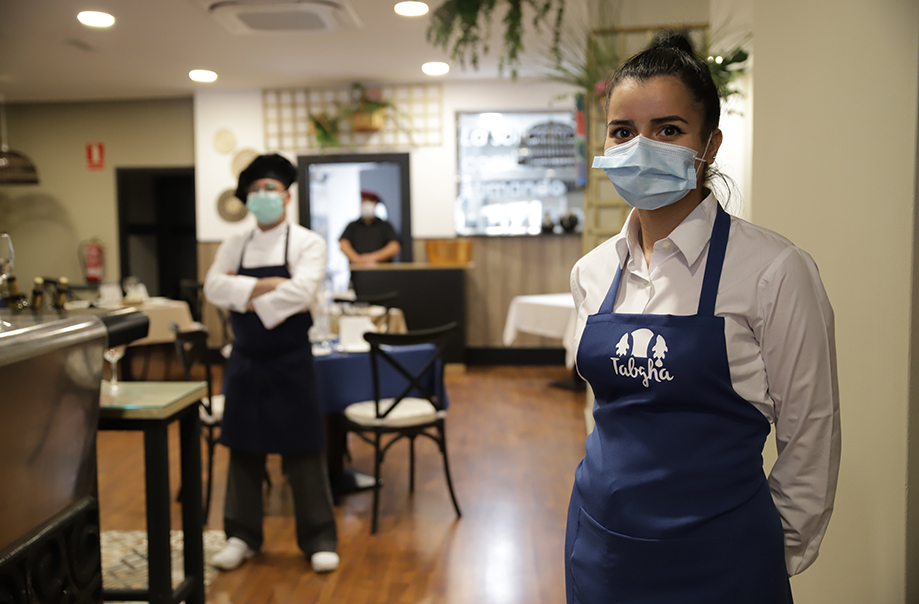They are the example of hidden work, behind every dish, behind every take-away menu there is one or more people who make possible moments, in many cases, unforgettable. A sector, at the same time, marked by precariousness and that has suffered, like few others, the scourge of the pandemic.
The hotel and catering industry is also a privileged means of labor insertion. Salvador Ruiz Pino, lawyer and director of Cáritas diocesana de Córdoba, whose projects Tabgha and Cinco panes,
Tabgha and 5 panes are two initiatives for social and labor insertion through the world of catering and hospitality. How did these initiatives come about?


The hospitality project of Caritas Diocese of Cordoba was born as a result of the last Ad limina visit (in March 2014) that our Bishop, Mons. Demetrio Fernández, made to Pope Francis. During the visit, when the Bishops of southern Spain explained to the Holy Father the socio-economic situation we were going through at that time, with high unemployment rates, the Pope told them: "Do something for young people". Upon returning from the visit, the bishop conveyed this desire of Francis and, after a needs assessment and a study of the situation, we saw the way to start a hotel school and a restaurant where we could train and hire young people in a situation of serious social vulnerability and exclusion. Thus we opened the doors Tabgha in December of the same year. As a continuation and expansion of this project, the Cinco Panes Catering, for the same purpose, in 2020.
What has been the response from the industry, the people and, of course, the beneficiaries?
-At all times we have received collaboration from the hospitality sector in Cordoba. In fact, our work would not be possible without the collaboration of many Cordovan companies in the sector that allow our participants to do internships in their businesses, in addition to teaching some of the classes during the training period.
Likewise, the Cordovan society has seen in the solidarity economy initiatives of Caritas an opportunity to collaborate with our institution and help the people we accompany by hiring a service or simply enjoying a pleasant evening in our gastronomic tavern with the best service and quality.
Each year, around twenty young people are trained and hired in cooking, table service and waiter, according to the training they themselves select, for their subsequent insertion in the hospitality labor market, from personalized itineraries of socio-labor insertion. The success of social and labor insertion of the young people who have gone through the project is very high.
What would you highlight about these initiatives that also train people to work in a field of service to others?
-The COVID crisis has shown us clearly what is truly essential, what is important: life, health, care, support, care of the planet "our common home"... From Caritas we are convinced that it is urgent to implement an economy that prioritizes all this that we consider essential, an economic model centered on people, that respects their rights and bets on the potential of those who are often discarded. That is why, although we do not have the capacity to solve the problem of unemployment in our territory, we are convinced that this type of significant action is necessary to show that another model is possible, that it is worthwhile to put people and their potential at the center and to fight against the throwaway culture with proposals that recognize the dignity of all. Anyone who comes to Tabgha Gastronomic Tavern can experience the satisfaction of being able to see the enthusiasm, commitment and effort that the young people who work there put in every day to offer the best service, being the protagonists of their own journey that will lead them out of the very difficult situations they have gone through in the past.
SOLEMCCOR is the company that manages both projects. How was this Caritas initiative born? What is the assessment of its work after several years of operation?
-From this commitment to decent employment were born, already in the 80s, the employment programs of Caritas Diocese of Cordoba, which in 2006 took a qualitative leap with the establishment of SOLEMCCOR (Solidarity and employment of Caritas in Cordoba), our insertion company, the first in Andalusia and one of the main nationally. An insertion company where Caritas is the sole partner and whose objective is to favor the labor insertion of people in a situation of social exclusion and their final inclusion in the normalized labor market.
SOLEMCCOR is non-profit, the purpose of our business activity is to enable training and employment opportunities for people in situations of social vulnerability for their full integration. Thus, the generation of the maximum number of jobs, along with decent working conditions are the firm objectives of SOLEMCCOR, through personalized itineraries and the development of a personal integration project. Through training, access to employment and social and professional monitoring, we make it possible for the people we accompany to acquire experience and skills.
In short, it enables the acquisition of the professional qualifications and productivity necessary to improve personal employability conditions, as a prior step to accessing the ordinary company, in accordance with the provisions of the regulations governing the establishment and operation of companies for social and labor insertion. All this, moreover, from a model that combines care for the environment with programs that promote recycling from a perspective of integral ecology, where awareness for the care of the planet is combined with concern for people.
In 2020, we were able to welcome and support 833 people through training or job placement, of whom 111 people in exclusion were hired.
Salvador Ruiz Pino. Director Caritas Cordoba
We want the people of Córdoba to become aware that when they recycle paper, cardboard, clothes or oil, they are providing new opportunities for the planet and for people in vulnerable situations, because, as Pope Francis says: Everything is connected.


Today SOLEMCCOR has different lines of business that include the selective collection of paper and cardboard (through a collaboration agreement with the Cordoba City Council), confidential paper destruction service, textile collection and recycling, "Jordan" cleaning service, "Dorcas" clothing workshop, management of the "Cristo Rey" Leisure and Free Time Center in Torrox Costa, Catering School, "Tabgha" gastronomic tavern and "Cinco Panes" catering. In all of them, last year (2020) we were able to welcome and accompany through training or labor intermediation 833 people, of which 111 people in exclusion were hired, all with an economic investment of three million euros.
The hospitality industry has been one of the economic sectors hardest hit by the pandemic. In the case of both initiatives, the people who benefit from them are already experiencing serious difficulties. how has covid had an impact on these two projects? how do you face the recovery?
-Certainly, the health crisis that erupted with the onset of the pandemic very soon manifested itself in a major social crisis in which we are now immersed.
Only in the past year, Diocesan Caritas of Cordoba has assisted 30,000 families throughout the province through its 168 parish Caritas offices, of whom 8,000 (27%) had never before turned to Caritas for help. Mobility restrictions meant that the hotel and catering sector was the first to cease its activity. However, despite this, SOLEMCCOR maintained all of its jobs during the pandemic situation, and no lay-offs were carried out. From the day after Tabgha was closed due to the state of alarm, the project workers, accompanied by volunteers, used the kitchens to prepare and distribute two thousand daily menus for the vulnerable families assisted by Caritas in the city of Cordoba, who during the hardest moments of the confinement lacked the resources to meet their basic food needs.
From the first day of the pandemic, project workers and volunteers used the kitchens to prepare and distribute 2,000 meals a day to vulnerable families.
Salvador Ruiz Pino.Director of Caritas Cordoba
Once the de-escalation phase has begun, Tabgha and Cinco Panes have returned to their regular activity, with the proper measures of capacity, safety and hygiene. Through its services, customers can not only enjoy a first-class culinary experience, with a very good value for money and exquisite treatment, but also help to improve the skills of young people at risk of social exclusion and serious vulnerability, thus promoting their full inclusion.
In Tabgha, as in the plain of the same name near Lake Tiberias, we are convinced that, by giving each of us our five loaves and two fish, we can multiply the opportunities of insertion of many people, satisfying not only the hunger for bread, but also for hope, dignity and justice. A must visit when you come to Cordoba!














